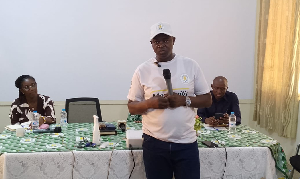 The Director-General of the Ghana Health Service, Prof Samuel Kaba Akoriyea
The Director-General of the Ghana Health Service, Prof Samuel Kaba Akoriyea
The Director-General of the Ghana Health Service (GHS), Professor Samuel Kaba Akoriyea, has disclosed that Ghana continues to grapple with high levels of severe child malnutrition nearly a century after the condition known as Kwashiorkor was first identified in the country.
Prof Akoriyea described the situation as alarming and called for urgent and coordinated national efforts to prioritise child nutrition and health.
Kwashiorkor, which means ‘the disease of the deposed baby when the next one is born’ in the Ga language, is caused by a severe protein deficiency and commonly affects children at weaning.
“It’s been 92 years since Cecily Williams, a Jamaican pediatrician, working at the Princess Marie Louise Hospital in Accra, defined the term Kwashiorkor. Yet, two-thirds of Ghanaian children are still malnourished, according to UNICEF,” he stated.
According to the 2022 Ghana Demographic and Health Survey (GDHS),18.2 per cent of children under five are stunted, 12.6 per cent are underweight, and six per cent are wasted (thin for their height).
These rates exceed the World Health Organisation (WHO) thresholds for low-burden malnutrition, which recommends wasting be kept below five per cent, stunting under 15 per cent, and underweight prevalence under 10 per cent.
In a ghanaiantimes.com.gh report on May 22, 2025, Prof Akoriyea pointed to cultural misconceptions about childhood nutrition, noting that some equate obesity with good health.
“We have not been able to send the right messages. Some people think malnutrition is only about being thin, but overnutrition is also a growing problem,” he said.
He stressed the need for better public education and called on stakeholders across sectors to treat child health as a shared responsibility.
The 2023 UNICEF State of the World’s Children Report classified Ghana among countries at ‘moderate to high’ risk of missing child nutrition targets.
It cited weak integration of nutrition programmes with sectors such as agriculture, education, and water, sanitation and hygiene (WASH), as well as insufficient funding for nutrition-sensitive interventions.
Prof Akoriyea said that without urgent action, Ghana risks falling short of global health targets, including Sustainable Development Goal 2, which aims to end all forms of malnutrition by 2030.
Malnutrition, which includes both deficiencies and excesses in nutrient intake, affects physical and cognitive development in children and poses a long-term threat to national productivity and economic growth.
“We must act now to protect the future of our children and the development of our country,” Prof Akoriyea urged.
MRA/VPO
You can also watch the latest news on GhanaWeb TV below:
